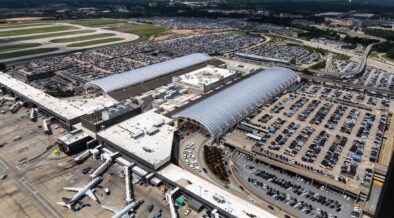
Hartsfield-Jackson Atlanta International Airport continues to innovate and grow as it prepares to handle 125 million passengers per annum within the next five years, writes Joe Bates.
Airports don’t get much bigger, and some would say any better than Hartsfield-Jackson Atlanta (ATL) which, with the notable exception of COVID impacted 2020, has been the busiest gateway on the planet for passenger traffic for more than two decades.
Indeed, since it replaced Chicago O’Hare as the world’s busiest gateway in 1998, it has gone from strength to strength and welcomed the second highest volumes in its history last year when 108.1 million passengers passed through its facilities.
As well as an upturn in passengers in 2024, ATL also recorded year-on-year increases in aircraft movements and cargo volumes when it handled 796,224 take-off and landings (+2.6%) and 354,974 tonnes (+7%) of freight respectively.
ATL’s passenger total – it’s closest rival for the No.1 spot Dubai International Airport (DXB) welcomed 92.3 million passengers in 2024 – represented an increase of 3.3% on the previous year and was just 2.2% below the record 110 million it handled in pre-COVID 2019.
And with hub carrier Delta Air Lines continuing to expand its route network, and interest in flying to ATL seemingly at an all-time high from foreign carriers, there is much more to come in terms of passenger growth.


©2021 Decisive Moment Event Photojournalism, ATL Airport marketing.
Putting this in perspective, ATL expects to reach the unprecedented milestone of accommodating 125 million passengers per annum within the next five years and could potentially be handling an incredible 140 million passengers annually by 2040/2050.
Ensuring that it is equipped to meet this sizeable increase in traffic, at the same time as retaining its award-winning levels of customer service and operational efficiency, will be a significant challenge for ATL.
However, it appears to be a challenge that the airport is on top of based on the ongoing $3 billion expansion and development of Terminal C, the $1.4 billion expansion of Concourse D and South Terminal roadway modifications, in addition to future plans for a sixth runway and the modernisation of Concourse E as part of its multi-phase $20 billion ATLNext master plan designed to future proof the airport.
Talking about the infrastructure challenge head for ATL and what the new facilities will bring to the airport, general manager, Ricky Smith, said: “What others may see as challenges, we view as opportunities to better serve our passengers.
“Each project underway, as well as those we will undertake, align with maintaining our status as ‘the world’s busiest and most efficient airport’.
“These initiatives underscore our growth forecasts of 125 million annual passengers by 2030. This demands near-term action on capacity and resiliency, and future-proofing our facility to provide the very best passenger experience possible.”


© 2021 Decisive Moment Events, Concessions at Hartsfield-Jackson Atlanta International Airport in Atlanta, GA.
How big a role will new technology and innovation in all its forms play in helping increase the operational efficiency and, ultimately, the capacity of Hartsfield-Jackson Atlanta International Airport, going forward?
Smith says: “New technology and innovation are essential to enhancing our operational efficiency, and ultimately our passenger capacity.
“Whether it’s 5G-ready coverage that supports both travellers and first responders, a next-generation parking deck with real-time tracking and EV charging, or a widened and enhanced Concourse D that expands concessions, accommodates larger aircraft and more passengers, each advancement strengthens our ability to serve the world with speed, safety, and scalability.”


©2021 Decisive Moment Event Photojournalism, ATL Airport.
AIRLINES AND ROUTE NETWORK
Today, 27 airlines operate at ATL, providing non-stop services to over 160 domestic and 80 international destinations in 51 countries across Europe, Asia, the Caribbean, Africa, and Central and South America.
ATL is Delta’s global hub, and its extensive route network from Atlanta makes it the leading carrier at the gateway by a significant margin, accounting for around 80% of all passengers.
Next in market share are Southwest (5%), Frontier (5%), Spirit (3%), all with operating bases at ATL, followed by American (2%).
International legacy carriers such as Air Canada, Air France, British Airways, KLM, Lufthansa, Turkish Airlines, and Virgin Atlantic all serve ATL, the former adding Montréal as a new destination from Atlanta on June 1.
New long-haul routes added in 2024 included Abu Dhabi (Etihad) and Brussels (Delta) while Burbank, Fresno and Santa Barbara were among the new domestic services.
NEW LEADERSHIP TEAM
It should be noted that general manager Ricky Smith is actually new to the role having only officially joined ATL in April, moving from the position of CEO of the Maryland Aviation Administration, which operates Baltimore/Washington International Thurgood Marshall Airport (BWI).
His appointment has allowed ATL to promote Jan Lennon to the post of executive deputy general manager. Without doubt the airport’s former deputy general manager for operations and most recently interim airport general manager, Lennon, will offer Smith a wealth of local knowledge and experience as he grows into the role as boss of world’s busiest airport.


©2021 Decisive Moment Event Photojournalism, ATL Airport,
Announcing his appointment, Mayor of Atlanta, Andre Dickens, stated: “Ricky Smith’s extensive experience in airport management will provide dynamic leadership to drive Hartsfield-Jackson’s continued growth.”
While Smith himself noted: “Leading the world’s busiest and most efficient airport is both a tremendous responsibility and an incredible honour.
“ATL is a powerhouse in global aviation, and I look forward to building upon its legacy of excellence with a focus on innovation, efficiency and world-class service.”
So, how have the first few months gone for Smith? Has anything about ATL surprised or delighted him or has he learned something about the airport/Atlanta that he didn’t know before he joined?
He replies: “Something I didn’t know before that I am learning every day is how impressive the people are who work here.
“Hartsfield-Jackson is not great because it’s the busiest and most efficient airport in the world. We are the busiest and most efficient airport in the world because our people are great.”


CELEBRATING 100 YEARS OF ATLANTA AIRPORT
With traffic booming again and work underway to raise ATL’s operational efficiency and handling capabilities, Smith certainly joins the airport at a good time in its growth trajectory.
He also happens to have joined ATL in a milestone year as 2025 marks the 100th anniversary of the airport, which it will celebrate from now until September 2026 through holding a series of public-facing events and internal initiatives designed to highlight the gateway’s role in connecting people and driving progress.
The first of its centennial events was held in April with what was described as a dynamic and inspiring event honouring a century of aviation leadership.
Held in the Domestic Terminal Atrium, the ATL Centennial Press Experience welcomed city leaders, all living past Atlanta mayors, members of the Hartsfield and Jackson families, airport officials, celebrity ambassadors and community stakeholders to reflect on ATL’s legacy and future as a global leader in air travel.


Speaking at the event, Smith noted: “This celebration is a moment to honour the bold vision and leadership that made ATL the global hub it is today.
“As we celebrate 100 years of history, we also embrace the next century of growth, innovation and global connection.”
The celebration came hot on the heels of the announcement that ATL had once again been named as the Best Airport by Size and Region in North America in ACI World’s annual ASQ Airport Experience Awards.
This year it shared the ASQ accolade with Dallas Fort Worth (DFW) and Toronto Pearson (YYZ), the prestigious award being based on passenger opinions gauged on the day of travel.
SISTER ACTS
ATL is a big fan of partnerships and co-operating with international airport operators as a way of exporting its operational and management expertise, potentially boosting traffic and sharing best practices.
Earlier this year it signed its 13th Sister Airport Cooperation Agreement with Edmonton Airports, which operates Edmonton International Airport (YEG) and Villeneuve Airport (ZVL). It is the first Sister Airport Agreement signed with a Canadian airport authority.
According to ATL, the partnership represents a shared vision of innovation, collaboration and economic growth, linking two major North American aviation hubs through knowledge exchange and operational co-operation.


“This sister agreement strengthens the direct connection between our two airports and commits us to a long-term partnership that will foster innovation, expand global connectivity and drive new business and investment opportunities,” said ATL’s Lennon.
“We look forward to working together to turn this agreement into real, measurable progress that benefits both of our airports, our cities, and the passengers we serve.”
As a result of the agreement, ATL and YEG will collaborate in key areas such as sharing best practices on passenger and cargo operations, customer service, and infrastructure development.
They have also agreed to explore ways of co-operating on sustainability and innovation, potentially by partnering on initiatives such as green energy advancements, technology integration, and operational efficiencies.
Other airports that ATL has sister agreements with include El Salvador-San Óscar Arnulfo Romero y Galdámez (SAL); Airports Company South Africa; and the Federal Airports Authority of Nigeria.
SUSTAINABILITY INITIATIVES
Hartsfield-Jackson Atlanta International Airport has created a comprehensive sustainability programme that it believes establishes it as a frontrunner in the industry.
Its ‘green’ goals include making sure that less than 10% of the 13,000 tons of waste generated at ATL each year goes to local landfills by 2035; the absolute minimum of LEED Silver certification for all new buildings, roadways and runways; and the commitment to transition to 100% clean and renewable energy by 2035 and net zero carbon emissions by 2050.
The targets of GreeningATL are said to reflect the airport’s commitment to achieving the triple bottom line — people, planet and profits – while working to become the world’s ‘greenest’ airport.
On the GreeningATL page on its website, ATL states: “Through innovation and cutting-edge technologies, Hartsfield-Jackson strategically incorporates a common-sense approach to manage our resources to ensure a sustainable future.


“To that end, the Department of Aviation has pledged to plan, build, operate and maintain an integrative approach to achieve measurable results that propel our community, stakeholders and the environment. GreeningATL is where thinking ‘green’ becomes routine.”
Its most recent commitment to reducing its carbon footprint included the opening of a solar panel array at Fire Station 40.
The installation will generate 40% of the Fire Station 40’s electricity and is the first of several units to be installed throughout ATL as part of the Solar Atlanta Program, a proactive solar energy purchase agreement among the City of Atlanta, CSE, and Hartsfield-Jackson.
This strategic partnership marks a significant milestone in the airport’s clean energy ambitions.
Bryan Benefiel, senior aviation executive and ATL’s chief financial officer, noted: “The Fire Station 40 initiative is just the latest in a long line of sustainability and green actions.
“In addition to these clean energy-generating panels, we have secured third-party certifications for a number of our construction projects, and we’re increasing electric vehicle charging stations throughout the airport campus.”


© 2021 Decisive Moment Events, Concessions at Hartsfield-Jackson Atlanta International Airport in Atlanta, GA.
ECONOMIC POWERHOUSE
As you would expect, ATL is a major economic engine for Metro Atlanta and the State of Georgia, generating $34.8 billion in economic impact locally and $66 billion across the state.
It is directly responsible for 63,000 jobs, making it the state’s largest employer, and indirectly for up to 380,000 more across the state and beyond.
The airport is also directly expanding its influence outside of the perimeter fence by being a key partner in the Aerotropolis Atlanta Alliance, a public-private partnership, which aims to improve economic prosperity around the airport in neighbouring South Fulton and Clayton counties.
ATL’s key economic importance to Atlanta and the surrounding region as well as the latest news and innovations at Aerotropolis Atlanta will, of course, be under the microscope at the upcoming SMART Airports & Regions Conference and Exhibition in Atlanta.






